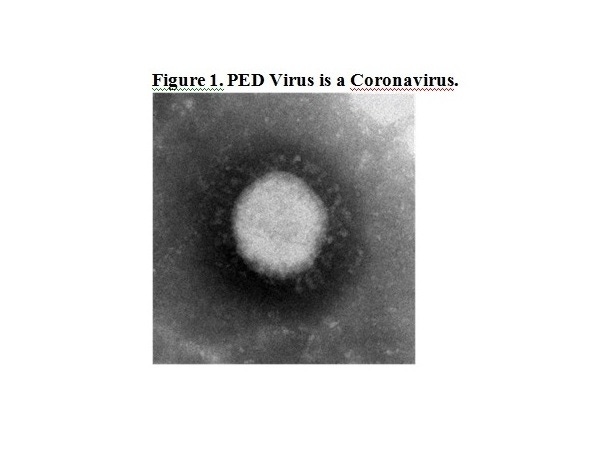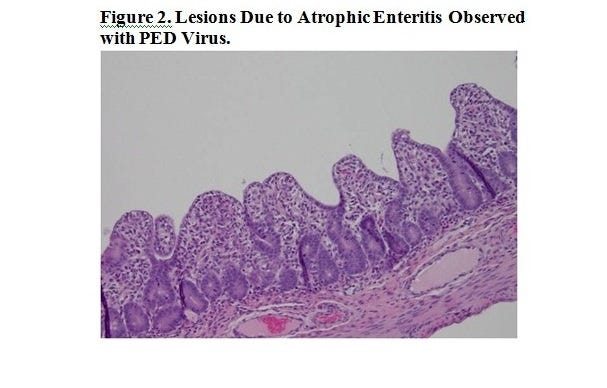Diagnosing Porcine Epidemic Diarrhea (PED) Virus
July 1, 2013

Porcine epidemic diarrhea (PED) virus is a virus of swine that has been isolated in Europe and Asia during the last several years. In recent months, this virus has been found in the United States and is causing major problems in the swine industry.
PED virus is a coronavirus (Figure 1), which means it is in the same family as transmissible gastroenteritis (TGE) virus. PED virus infects pigs through the oral route and replicates in the cells lining the small intestine.

The incubation period is just 1-2 days; infected pigs can experience bouts of diarrhea for 7 to 11 days. Large amounts of virus are shed in the feces, which are the source of infection for naïve pigs.
PED Diagnosis
To diagnose this virus, the same basic guidelines used to obtain samples for other causes of diarrhea apply. The ideal pigs to select for sampling are those acutely affected with watery diarrhea; pigs may or may not be vomiting. Samples from these pigs should be taken shortly after euthanasia to preserve the integrity of the small intestine.
Gross lesions are not very informative; instead, look for intestines that are filled with liquid contents.
Collect at least six gut sections distributed throughout the length of the small intestine. Two sets of intestinal samples should be sent to the laboratory – one set of fresh samples and one set of samples fixed in 10% buffered formalin. Collecting a complete set of tissues, including stomach, colon, tonsil, lymph node, lung, heart, spleen, liver and kidney are useful to rule out other causes of disease.
Like what you're reading? Subscribe to the National Hog Farmer Weekly Preview newsletter and get the latest news delivered right to your inbox every Monday!
All samples should be sent to the lab in an insulated box with ice packs using overnight shipment.
At the diagnostic lab, tissues will be evaluated under a microscope for lesions of atrophic enteritis (Figure 2) caused by PED virus. These lesions are the same as those observed in cases of porcine rotavirus or TGE virus infection. Confirmation of PED virus infection requires detection of the virus RNA by polymerase chain reaction (PCR).

Other samples that can be sent to the lab to be tested for PED virus by PCR are fecal samples from live pigs, rectal swabs, feedback material and environmental swabs. Detection of antibodies against PED virus in serum is not currently available in the United States.
You might also like:
Senators Offer Bill to Restrict Use of Antibiotics in Food Animals
You May Also Like


